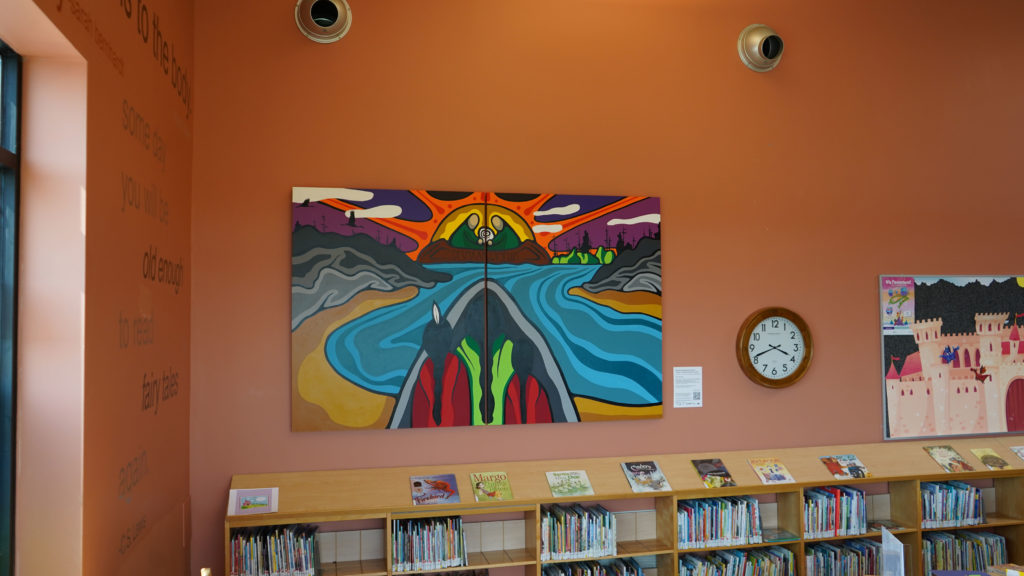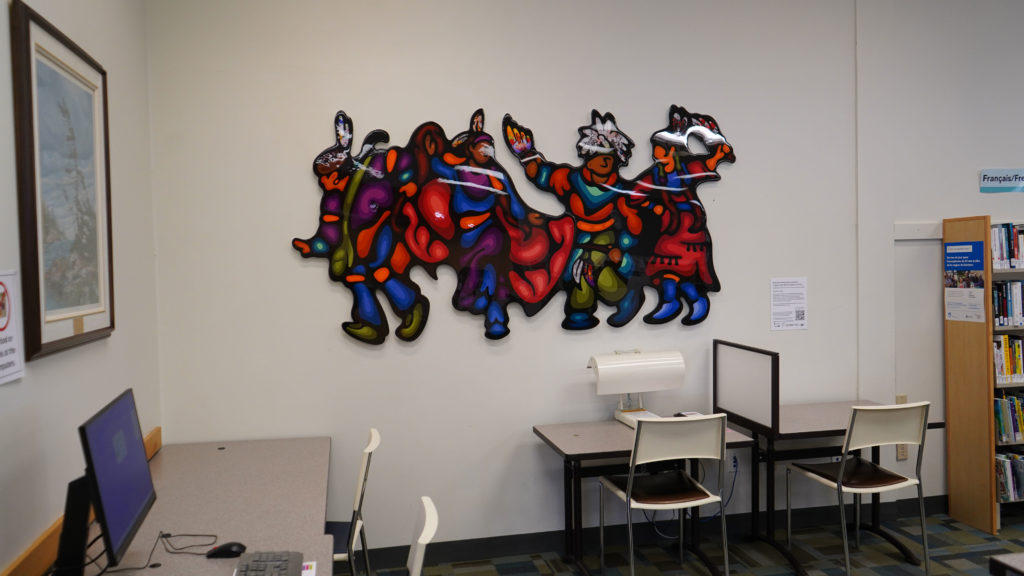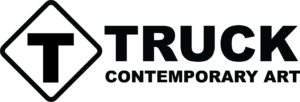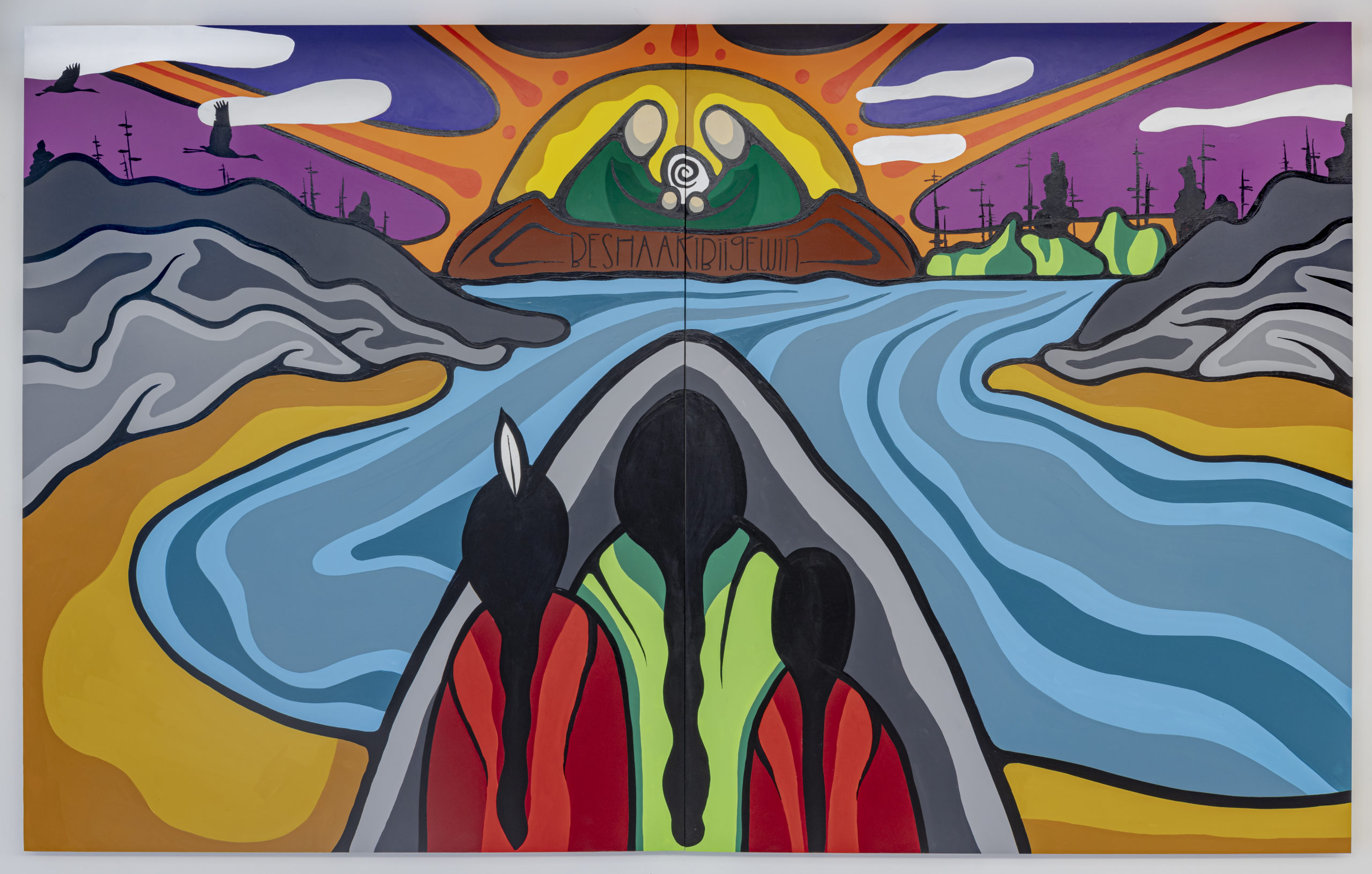Curators: Missy LeBlanc, Erin Szikora
Artists: Lacie Burning, Melody Crowe, Jon Colwell, Sabrina Fontaine, Laura Grier, Jay Havens, Mem Ireland, Sarah MacLeod-Beaver, Sheri Osden Nault, Skye Paul, Matthew Stevens, Michael Tiggelman, Dr. Elder Shirley Williams
Mamanaw Pekiskwewina | Mother Tongues: Dish With One Spoon Territory is the second of four locality specific iterations of the Mamanaw Pekiskwewina project and is presented in tandem with the tour of Taskoch pipon kona kah nipa muskoseya, nepin pesim eti pimachihew | Like the winter snow kills the grass, the summer sun revives it, across so-called Canada. Developed in consultation with region-based Elders, Knowledge Keepers, language teachers, and educators, Mamanaw Pekiskwewina: Dish With One Spoon Territory celebrates and makes visible the traditional and ancestral languages of the lands covered by the Dish With One Spoon treaty, an agreement made between the Anishinaabek, Mississauga, and Haudenosaunee Nations to share the resources and responsibilities of the territory. Mamanaw Pekiskwewina: Dish With One Spoon Territory is co-curated by Missy LeBlanc and Erin Szikora for The Robert McLaughlin Gallery.
E-NOKIICHIGAADEK WIINDIMAAGEWIN
Wenesh ediming pii gdoo-zhigiizhiwewin [1] aawizinok ggashi naasaab miiniwaa gnokomisag? Wenesh ediming zhi-giizhiweng nowewin giin debendiziiwon, e-aawzinok nowewin gaa-miigowin miiniwaa ezhi-jiwong giin biinjina, ezhi-mingowin?
E-ninaasaabsek zhiwe nowewining kina mooshin akiin; nowewin zhinoomaagemgwad e-zhi-kendimong gegoo e-kendimong miiniwaa gdi-kinoomaagonaa waa-zhi mindizoying enso-bebezhig miiniwa aki. E-bi-zhi-koginigoong maanda nowewin debendaaksinok, maanda nowewin gaa-mji-miingowewziying gonda sa nji-gaa-bi-digoshnajig, mooshkin mgoshkaajiikemgwad bimaadiziwin miiniwaa giw bimaadiziiwinwaa mshi-ebi-yaasigwaa. Gda-ni-jiibkenwedaanaa miiniwaa dash gda-ni-mnowaangismi biinjina miiniwaa gdi-noweninaa eni-piichi-maajiibdeg kwii-yoomnaang miiniwaa ni-zhinoomaagwiing waa-ni-zhaaying. Wenesh dash e-zhiwebak pii nindan kidwenan eni-zhinoomaagemgok waa-ni-zhaayin bebkaanak kidwenan dash gewiinwaa gaa-zhinoomaagwaad zhaazhi-gaamaajaajig, nindan dash kidwenan mii-na ni-bnaadak nji-sa maanda waabshkiiyewin?
Mamanaw Pekiskwewina Ezhi-gashiwing Deniiwan gii-ntami zhichigaade oodi zaagijeying zhinoomaagewin oodi Calgary Aapitoweying Mzinigan-gamik pii Binaakwe-giizis-Minidoo-giisoonhs 2019. Gii-zhinoomaadim enji-maanjiining nji-sa Taskoch pipon kona kah nipa muskoseya, nepin pesim eti pimachihew Dibishkoo iwa Bibooni-goon e-zhi-nsigemgok miishkoonsan, maaba niibin giizis neyaab bi-maajiigtoon, maanda zhinoomaagewin oodi TRUCK Nongo e-zhinaagok/ Mzinbiigewin pii Baashkaakodin/Minidoo-giisoonsing 2019. Iwi dash aanji-zhinoomaagewin e-zhinikaadek Maamanaw Pekiskwewina gii-biijigaadeg e-maamowi-zijig mesinibiigejig nji-sa niiwing Anishinaabek nowewin enji-baajig zhiwe Treaty 7 nekeyaa – Nakoda, nehiyawewin, Nitsiipowahsiin, miiniwaa Tsuut’ina – wiinwaa gaa maamowi-sidowaad di-nowewinwaa e-zhchigewaad. Maanda dash zinoomaagewin neyaab gii-miinaawag ntam Anishinaabek zhiwe nekeyaa e-yaajig, e-piichi-mshkooziitoowaad maanda doo-a-kiimwaa zhiwe yaa’ing gegoo mooshkin mwijigaadek nowewin mewzha zhichigewinan e-zhi-jiibkenwiying miiniwaa geyaabi bemjiwong biinjina yaa’ing.
Maanda dash bebaa-zhinoomaading Taskoch pipon kona kah nipa muskoseya, nepin pesim eti pimachihew mompii mzowe-kamik Canada e-szhinikaadek, nindan e-zhi-miiksemgak zhinoomaagewinan aabideg gii-aanji-gnowaabnjigaadenoon; gaawii dash go ngoji pkaan zaagigeying zhinoomaagewin, Mamanaw Pekiskwewina gii-daapinigaade ji-aawong nokiiwin waani-zhiseg nendaasowin zhiwe waa-nji-zhinoomaading nindan. Giw waa-zhitoojig maanda da-aabji’aawan Mamanaw Pekiskwewina – e-wiijiiwed Anishinaabe gekendang maanda zhichigan debendaagozid zhiwe – ji-zhichigaadeg maajiishkaawinan nji-sa e-yaajig zhiwe Anishinaabek miiniwaa ji-mina-maajiishkaamgok di-nowewinwaa. Maanda dash ediming “Zhiwe besha” maanda sa nji-maajiishkaawin ngoji pkaan ni-zhaamgod e-zhi-kenjigaadek miiniwaa zhaagonaashii nsastaagewin nikeyaa ooshime e-zhi-gnoonindowaa Anishinaabek debendaagozijig nongo megwaa miiniwaa mewzha gaa-daajig zhiwe akiing monda e-zhidigok megwaa yaawaad.
Maanda dash bezhig naakinigewin nji-sa maanda Mamanaw Pekiskwewina gonda maanda e-miikigig ji-gnoonaawaad Anishinaaben zhiwe endaajig miiniwaa ji-bzindamoowaad nendowendimoowaad ji-yaamowaad asgaabwitaagewin nji-sa ji-naawseg maanda nowewin ezhi-mzinbiigeng. Ezhi-bigosenjigaadeg maanda zhichigewin ji-aansek gbeying naakonigewin zhiwe enji-nokiichigaadeg maanda gonda e-miikigig zhichigan ezhi-aasgaabichigaadek Anishinaabe naadiziwin enokiijig miiniwaa mesnibiigejig gewii go ji-naakmichigaadeg giigidoowin, ezhi-aansek, miiniwaa gbeying nokiitaadiwin nji-sa Anishinaabek debendaagozijig mooshkin e-piichi mina-daabinigaadek gwek nowewin zhichiganan nji-sa akiing.
Mamanaw Pekiskwewina: Naagan Teg Bezhig Emkwaan minik-ekonaabing aawan eko-niizhing niiwin minik aanji-zhichigeng maanda sa Mamanaw Pekiskwewina zhichigan miiniwaa zhinoomaagaade pii zhinoomaading pipon kona, nepin pesim odi mzowe Canada eshnikaadek. Gii-maajiikigaade dibaajimatoodwaa eyaajig getizijig, ge-kendigig gegoo, Anishinaabemowin ekinoomaagejig. Mamanaw Pekiskwewina: Naagan Teg Bezhig Emkwaan minik-ekonaabing aawan mnaajchigaade miiniwaa zhichigaade ji-waabnjigaadek naadiziwin miiniwaa gegeti nowewin nji-sa minik maanda Naagan Teg Bezhig Emkwaan minik-ekonaabing, naakonigewin zhichigan gaa-zhitoojig Anishinaabek Mississauga, miiniwaa Haudenosanee Mzowe ji-maandookiiyaad kina gegoo eteg miiniwaa naadimaadiwin zhinda ekonaabing. Mamanaw Pekiskwewina: Naagan Teg Bezhig Emkwaan minik-ekonaabing gonda Missy LeBlanc miiniwaa Erin Szikora gii-naabsidoon maanda nji-sa Robert McLaughlin Mzinbiiganag enji-gnowenjigaazowaad.
SHKWAAJ NENDIMOOWIN
[1] Maanda memoonji nakaazong ediming “Ezhi-gashiwing Deniiwan” miiniwaa ‘ntam nowewin’ nji-sa iwi nowewin maaba e-ntami-yaad pii-binoojiiwid gaa-kendang miiniwaa geyaabi ezhi-giigdod endaat. Booj dash go, niibina Anishinaabek mzowe mompii akiing dinkaaznaawaa maanda kidwin “ezhi-gashiwing deniiwan” wii-kidwaad edming nowewin njisa wiinwaa gashiwan miinwaa / maage mewzha nowewin. Maanda zhibiigan gnowaabnjigaade iwi ntam gaa-dibaachigaadek zhiwe kidwin “ezhi-gashiwing deniiwan”
PROJECT STATEMENT
What does it mean when your mother tongue [1] is not the language of your mothers and grandmothers? What does it mean to speak in a language that is not your own, that is not the language that has been passed down and flows through you, sustaining you?
Embedded within languages are entire worlds; language reveals how we know what we know and teaches us how to relate to one another and the land. Being raised with a foster language, a language forced onto us by colonizers, affects all aspects of a life and the lives of those that come after. We take root and are nourished within and by our language as it moves through our bodies and guides us. But what happens when the words that guide you are not the same words that guided your ancestors, but are words instead tainted by imperialism and colonialism?
Mamanaw Pekiskwewina | Mother Tongues was first conceived as an offsite exhibition at the Calgary Central Library from October-December 2019. It was presented in concert with Taskoch pipon kona kah nipa muskoseya, nepin pesim eti pimachihew | Like the winter snow kills the grass, the summer sun revives it, an exhibition at TRUCK Contemporary Art in November/December 2019. The original iteration of Mamanaw Pekiskwewina brought together emerging artists from the four Indigenous language groups of the Treaty 7 region—Nakoda, nēhiyawēwin, Nitsiipowahsiin, and Tsuut’ina—who incorporate their ancestral languages into their practice. The exhibition gave space back to the First Nation communities of the area, while asserting that the Indigenous lands that we occupy carry specific language traditions that root us to this land and still flow through us.
For the tour of Taskoch pipon kona kah nipa muskoseya, nepin pesim eti pimachihew across so-called Canada, the relationship between the exhibitions had to be reimagined; rather than a specific offsite exhibition, Mamanaw Pekiskwewina has been adapted to act as a framework of engagement for right relations to the localities of each of the tour locations. Each of the host organizations will utilize the Mamanaw Pekiskwewina—aided by an Indigenous Assistant Curator who has ties to the region—to develop programming that engages with the local Indigenous community and their language revitalization efforts. The definition of ‘local’ for this project has moved away from civic borders and the colonial understanding to one that is more region based and defined in consultation with the Indigenous people that currently and historically reside on the land the host organizations occupy.
One of the main intentions of the Mamanaw Pekiskwewina is for the host organization to engage with the local Indigenous community and be responsive to their needs when it comes to supporting language revitalization efforts through art. The hope is that this engagement will spark long-term institutional change with the host organization by supporting Indigenous cultural workers and artists as well as building a dialogical, reciprocal, and sustainable relationship with the Indigenous community at-large while taking into account the specificity of the language traditions of the land.
Mamanaw Pekiskwewina: Dish With One Spoon Territory is the second of four locality specific iterations of the Mamanaw Pekiskwewina project and is presented in tandem with the tour of pipon kona, nepin pesim across so-called Canada. Developed in consultation with region-based Elders, Knowledge Keepers, language teachers, and educators, Mamanaw Pekiskwewina: Dish With One Spoon Territory celebrates and makes visible the traditional and ancestral languages of the lands covered by the Dish With One Spoon treaty, an agreement made between the Anishinaabek, Mississauga, and Haudenosaunee Nations to share the resources and responsibilities of the territory. Mamanaw Pekiskwewina: Dish With One Spoon Territory is co-curated by Missy LeBlanc and Erin Szikora for The Robert McLaughlin Gallery.
END NOTE
[1] The most common usage of the terms ‘mother tongue’ and ‘first language’ refer to the language that a person first learns during childhood and still speaks at home. However, many Indigenous groups around the world use the term ‘mother tongue’ to refer to the language of their mothers and/or ancestral language. This text observes the latter usage in reference to the phrase ‘mother tongue’.
Conversations on Ezhi-gashiwing Deniiwan
Conversations on Ezhi-gashiwing Deniiwan: Part 1
January 29, 2022 1:00 PM – 2:30 PM
A conversation with Laura Grier, Matthew Stevens, and Melody Crowe, moderated by Erin Szikora.
Conversations on Ezhi-gashiwing Deniiwan: Part 2
February 12, 2022 1:00 PM – 2:30 PM
A conversation with Lacie Burning, Sarah MacLeod-Beaver, and Dr. Elder Shirley Williams, moderated by Missy LeBlanc.
Embedded within languages are entire worldviews. They shape the way we consider ourselves, our environment, and our relationship to those around us. Within so-called Canada there are over 60 distinct Indigenous languages, however, only three are expected to survive the next 100 years—nēhiyawēwin, Anishinaabemowin, and Inuktitut [2]. Despite this dire situation, Indigenous people across this land now known as Canada are taking up the fight to revive and preserve their mother tongues.
Please join us January 29th and February 12th for Conversations on Ezhi-gashiwing Deniiwan, a two-part series exploring the importance of Indigenous languages across Dish With One Spoon Territory. Hear from artists, language teachers, and community organizers who are at the front lines of language revitalization work in our communities.
END NOTE
[2] Gessner, Suzanne and Lorna Wanosts’a7 Williams. Indigenous Languages Recognition, Preservation and Revitalization: A Report on the National Dialogue Session on Indigenous Languages: Abridged Version. Brentwood Bay, BC: First People’s Cultural Council, 2017.
Community-Informed Murals
June 1, 2022 – October 29, 2022
We are pleased to present two community-informed murals by artists Jon Colwell and Jay Havens this summer from June 1st to October 29th at the Delpark and Jess Hann branch libraries. The murals were developed in consultation with local students and Indigenous community members, reflecting the vibrancy and diversity of Oshawa’s Indigenous community, increasing Indigenous visibility and representation in public spaces across the city.

ABOUT THE ARTIST
Jon Colwell is a self-taught painter and digital artist with a lifetime of artistic practice. He resides on Scugog Island and is a proud member of the Missisaugas of Scugog Island First Nation. The main inspirations for his work include street art, graffiti, vinyl toys, punk rock, tattoos, and skateboarding.
This mural was designed in consultation with members of Bawaajigewin Aboriginal Community Circle.

ABOUT THE ARTIST
Jay Havens (he/him/they) is a multi-media 2Spirit artist, educator, and collaborator of Kanien’keha’ka and Scottish Canadian ancestry. Havens was born on Haudenosaunee Territory known as the Haldimand Tract and raised on Unceded Sto:lo and Musqueam lands close to Vancouver, Canada. He is a proud citizen of the Mohawk, Bear Clan from Six Nations of the Grand River.
This mural was designed in consultation with Grade 7-8 students from All Saints Catholic Secondary School. Their drawings can be seen in the feathers of the dancers.
Story and Song: Intro to Anishinaabemowin with Melody Crowe
June 18, 2022 10:30 AM – 11:30 AM
Join us virtually or in-person at Oshawa Public Libraries – Delpark Homes Centre Branch on Saturday, June 18th for a morning of stories and songs with Anishinaabekwe Melody Crowe. Learn the Anishinaabemowin names for the animals living around us. This event is hybrid with limited in-person capacity. To participate in-person, please email Erin Szikora at [email protected]. To participate virtually, please register with the link below. Each participant will receive a printable colouring book. This event is for all ages and is presented in partnership with Oshawa Public Libraries.
We invite you to download a free printable copy of our Story and Song: Anishinaabemowin Colouring Book illustrated by local Indigenous artists Sabrina Fontaine, Mem Ireland, Sheri Osden Nault, Skye Paul, and Michael Tiggelman. Anishinaabemowin translations provided by Melody Crowe.
Mamanaw Pekiskwewina | Mother Tongues: Dish With One Spoon Territory is presented in partnership with TRUCK Contemporary Art.

We acknowledge the support of the Canada Council for the Arts and the Ontario Trillium Foundation for this project.


